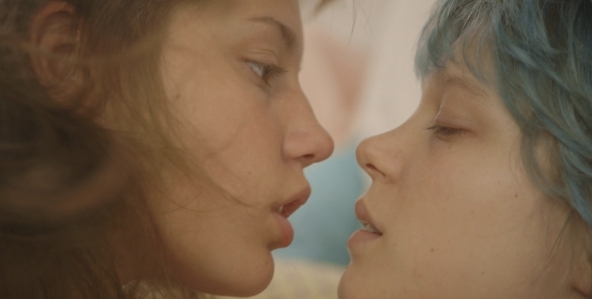The theatre was packed last Thursday at SIFF Cinema Uptown for the premiere of “Blue is the Warmest Color.” The new film from French director Abdellatif Kechiche has been lauded by audiences around the world since it won the Palme d’Or at the 2013 Cannes Film Festival.
While it has received an overflow of praise since its premiere—the complete lack of available seats in the theatre only confirmed its popularity—I still wasn’t prepared for the emotional blitzkrieg the movie turned out to be. Despite a few hiccups, the hype is right: “Blue is the Warmest Color” is a masterpiece.
The movie, based on a graphic novel by Julie Maroh, follows Adèle (Adèle Exarchopoulos), a young girl about to graduate high school whose life is thrust into both turmoil and bliss when she falls in love with Emma (Léa Seydoux), a blue-haired painter a few years her senior. As the relationship blossoms into love, Adèle both grows and fractures under the weight of her new identity, pushing both women to their limits.
There has been some controversy surrounding the film, with both actresses commenting on how severely Kechiche pushed them during the filming process. Regardless, it’s obvious that both actresses poured themselves completely into their work because the results from both are absolutely stunning. While Seydoux does a wonderful job with Emma, infusing her with a refined balance of confidence and vulnerability, the true standout here is Exarchopoulos. Her character never falters; one never feels that she is an actress playing a role. Her tears, sexual longing and insecurity are all visceral as we watch Adèle oscillate between self-discovery and emotional destruction over the course of the film.
The movie has a runtime of 179 minutes, but rarely feels like it’s trudging on longer than it needs to, because Kechiche never forces the story along. Rather, it unfolds methodically, giving the audience more than enough time to dig into Adèle’s daily life both before and after she meets Emma. He foregoes the usual coming-of-age lesbian trope of focusing on Adèle’s sexual discovery and clears most of those hurdles in the first portion of the film. Instead, the relationship itself becomes the center of the film—Kechiche focuses more on both women and their destructive attraction to each other than he does on Adèle’s sexual identity.
The film’s potent realism is aided by the spectacular dialogue, some of the most realistic I’ve ever heard. Every conversation feels completely genuine and we’re never fed the hackney lines we might expect from a romance. Emma’s conversation with Adèle about Sartre certainly comes close, but it feels so natural within the context of her character that it works.
This film’s greatest shortfall is the sex scenes. These have already received a fair amount of criticism since the film first premiered, most of which have been justified. It’s obvious what Kechiche wanted to accomplish with these scenes, some of which last as long as ten minutes: they are attempts to show the total, obliterating desire these two characters have for one another. Yet, these scenes go on for so long and are pushed to such strange, voyeuristic extremes, that they lose their impact and become boring. Some audience members at my screening actually laughed during one of the longer scenes.
Still, the film is a masterful piece of emotional devastation. It will be returning to the city Nov. 22 to play at Harvard Exit Theatre and shouldn’t be missed.














